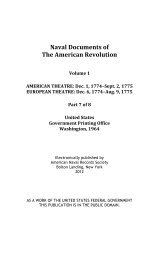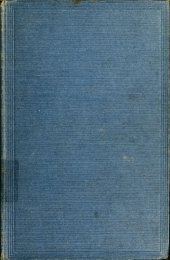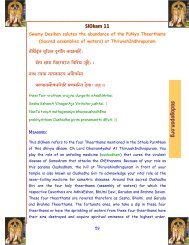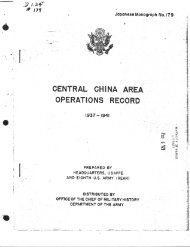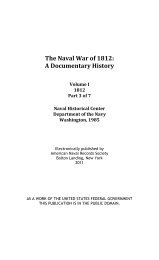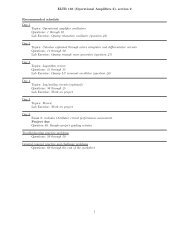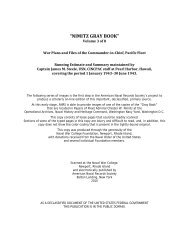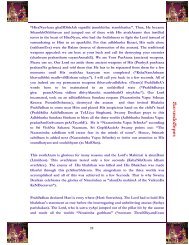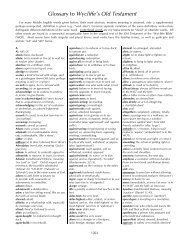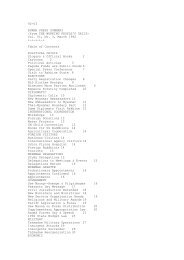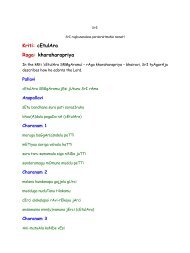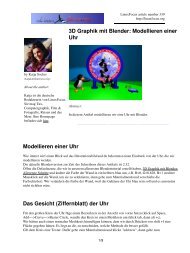Italian Bookshelf (download as PDF) - Ibiblio
Italian Bookshelf (download as PDF) - Ibiblio
Italian Bookshelf (download as PDF) - Ibiblio
Create successful ePaper yourself
Turn your PDF publications into a flip-book with our unique Google optimized e-Paper software.
448 “<strong>Italian</strong> <strong>Bookshelf</strong>.” Annali d’italianistica 25 (2007)<br />
nel suo contenuto, nel suo lessico e nella sua struttura logica. Ezra Pound riscopre la<br />
poesia di Cavalcanti e la rivaluta sotto una luce nuova, dove gli elementi della cultura<br />
medievale risultano molto vicini a quelli presenti nel dibattito intellettuale del suo tempo.<br />
Pound ammira le scelte lingustiche di Cavalcanti individuando nelle sue metafore<br />
significati profondi b<strong>as</strong>ati sulla fisica e legati ad una forma di linguaggio ideogrammatico<br />
occidentale.<br />
L’Ardizzone col suo lavoro e la sua ricerca offre un notevole contributo alla<br />
comprensione della poesia e del pensiero filosofico medievale. Il suo libro è frutto di un<br />
elaborato esame critico della poesia di Cavalcanti e di un attento studio analitico delle<br />
filosofie medievali. A lei si deve il merito di aver presentato un <strong>as</strong>petto meno conosciuto<br />
del Cavalcanti cioè quello di una filosofia naturale e di una logica che nelle canzoni<br />
esprime il legame tra fisica e logica da cui sarebbe poi nata la scienza moderna.<br />
Nicla Riverso, University of W<strong>as</strong>hington<br />
Elissa B. Weaver, ed. The Decameron First Day in Perspective. Vol. 1 Lectura<br />
Boccaccii series. Toronto: U of Toronto P, 2004. Pp. 270.<br />
This collection, sponsored by the American Boccaccio Association, comprises twelve<br />
interesting essays written in large me<strong>as</strong>ure by some of the most noteworthy Boccaccio<br />
scholars of North American universities. Unlike the slightly longer Lecturae Boccaccii<br />
Turicensis (edited by Picone and Mesirca and also published in 2004), this first volume<br />
of the University of Toronto Press’s new Lectura Boccaccii series aims to provide<br />
readings of the Decameron b<strong>as</strong>ed on the traditional Lectura Dantis format, spread out<br />
over ten volumes, one for each Day.<br />
Robert Hollander’s opening essay on the significant parallelisms between the<br />
Decameron’s proem and Ovid’s Remedia amoris is a fitting prelude to a collection that<br />
means to venture into some insufficiently explored, yet earnestly valuable <strong>as</strong>pects of<br />
Boccaccio’s m<strong>as</strong>terpiece. Hollander convincingly argues for seeing the proem <strong>as</strong> grounds<br />
for believing the Decameron, a “descendant” of the Remedia, to have “appetite” ― rather<br />
than Dantean moralization ― <strong>as</strong> its major premise, whether that appetite is “corrected” or<br />
“comp<strong>as</strong>sionately studied” (23).<br />
Thom<strong>as</strong> Stillinger’s lectura of the Decameron’s introduction takes the notion of<br />
“title” <strong>as</strong> its starting point and then goes on intriguingly to examine not only the<br />
Decameron’s title and subtitle <strong>as</strong> metonymy and metaphor, but also the pseudonyms of<br />
the members of the brigata and the meaning contained in rubrics. The introduction, then,<br />
may be seen <strong>as</strong> “a heading that stands in marked contr<strong>as</strong>t to the text that it heads” (49)<br />
and that “allows Boccaccio to move beyond rhetorical self-critique” (49).<br />
The reading of the Decameron’s first tale is presented by Franco Fido who begins<br />
with an overview of the novella’s critical history. Drawing insights from the juxtaposition<br />
of Ciappelletto with Frate Cipolla, Martellino and Brunetto Latini, Fido shows that,<br />
despite (or on account of) the absence of an “immutable frame of reference” (74)<br />
apparently required by religious themes, Boccaccio creates a fiction that meaningfully<br />
portrays the real power of words, proved through experience.<br />
Marga Cottino-Jones takes up the tale of Abraham the Jew. Minimizing the<br />
importance of previous source studies, she concludes that the real key to unlocking<br />
Boccaccio’s intentions here is to be found in the tales that frame it, I.1 and I.3. Where<strong>as</strong><br />
“mercantile logic” leads Ciappelletto to turn truth into believable falsehoods, it serves



